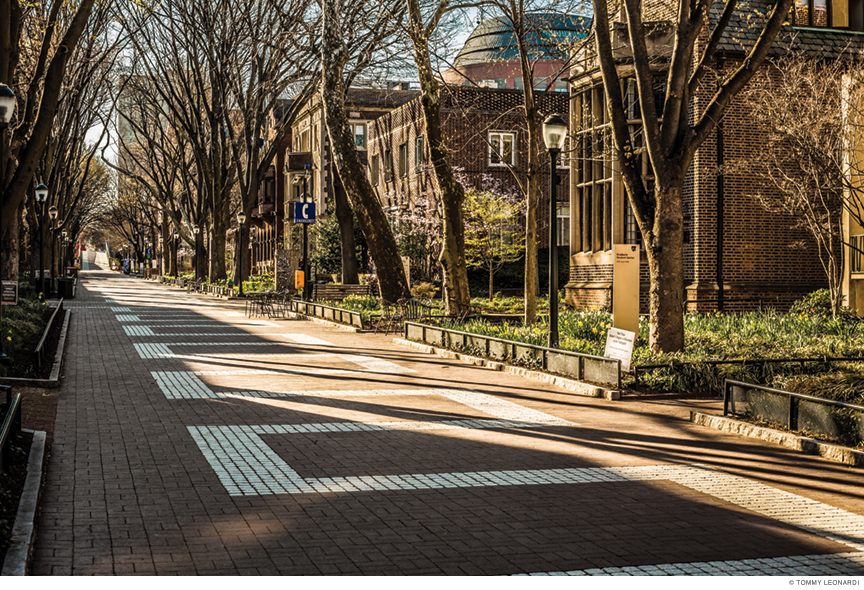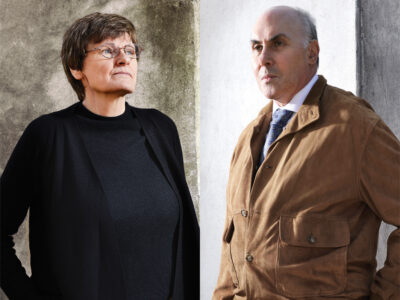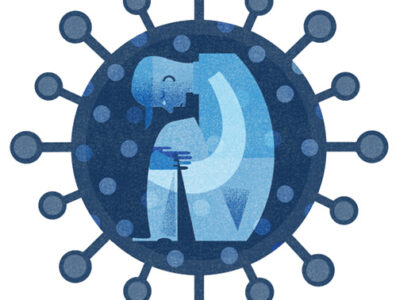
Sending students home and pushing classes and Commencement online, the University took dramatic steps to curb a global pandemic.
How to Help
From donating to various COVID-19 special response funds to promoting job and internship opportunities, there are several ways for Penn alumni to help current students affected by the pandemic—and support Penn Medicine’s efforts. Visit powerofpenn.upenn.edu/ways-to-help-penn-during-covid-19 for more details.
Seated in his office in the late afternoon of March 11, the Reverend Charles L. “Chaz” Howard C’00 had a sense of what was coming when his phone buzzed. Silence filled the air as he picked it up and studied a message from President Amy Gutmann and Provost Wendell E. Pritchett Gr’97, the latest in a string of increasingly urgent notifications regarding Penn’s response to the novel coronavirus outbreak.
When he finished reading the email, the University Chaplain looked up and took a deep breath. “It will be a year and a semester we talk about for a long time,” he said quietly.
Similar shockwaves were reverberating throughout campus at that moment. Shortly before states and cities were put on lockdown and terms like social distancing entered the common parlance, Penn’s March 11 update detailed seemingly unthinkable changes the University administration deemed necessary for the remainder of the spring semester. Students currently out of town for Spring Break that week were told not to return to campus, and those who remained in campus housing would need to depart by March 15 (later pushed to March 17). And all classroom teaching would be moved to virtual instruction beginning March 23, following a one-week extension to Spring Break.
“We will work diligently to ensure that every Penn student continues to receive a high-quality Penn education, and to ensure that graduating students can do so on time and without delay or interruption,” the notice read. “As disruptive as this might be on the surface, we will do everything in our power to minimize its interference with learning, which is the reason we are all here.”
The announcement rippled across campus in the form of postponements and cancellations. Student performances and scholarly events like the Silfen Forum and Perry World House Spring Colloquium were put on hold. Seniors would miss their final Spring Fling, juniors their Hey Day festivities. The Daily Pennsylvanian paused its print editions for the first time since World War II. The Ivy League cancelled all spring sports following its decision to cancel its postseason basketball tournament [See “Sports,” this issue], before other college athletic conferences, the NCAA, and major professional leagues followed suit. And the Penn Relays—the nation’s oldest and largest track meet, which last year celebrated its 125th consecutive running [“Penn Relays at 125,” Jul|Aug 2019]—was halted for the first time.
The Relays, which had been held against the backdrop of both world wars, had been scheduled to run from April 23–25, and although tentative plans were in the works for Franklin Field to host a smaller track meet later this year to make up for the loss, Penn Relays director Dave Johnson said in a statement, “Without the Penn Relays, springtime in Philadelphia will not be the same.”
The same day as the Penn Relays announcement—March 16—Associate Provost and Chief Wellness Officer Benoit Dubé informed the University community that three undergraduate students had tested positive for COVID-19 after traveling abroad for Spring Break. Hours later, perhaps the biggest domino fell as the University, following recommendations from the Centers for Disease Control and Prevention (CDC) concerning public gatherings, cancelled this year’s on-campus Commencement ceremony and Alumni Weekend.
Commencement and other graduation events will be moved to a virtual format that’s scheduled to be broadcast online on the same dates as had been originally planned, from May 16–18.
“Commencement is such an important tradition at Penn, a time of abundant joy and pride, where we all publicly celebrate the extraordinary achievements of our graduates,” Gutmann wrote. “While it will not be the same as our traditional ceremony, we are committed to finding the best way possible to recognize the achievements of the Class of 2020, and we will strive to make the virtual event as meaningful and celebratory as the circumstances permit.”
Gutmann added that the administration would explore the possibility of creating an on-campus celebration for this year’s graduates in the fall, as well as finding alternative dates for alumni to celebrate their class reunions. But later in March, the University opted to pause the planning process for all new in-person, on-campus alumni events and programs for the fall due to uncertainty about the timeline for recovery.
“I regret that this semester has been upended in so many ways,” the Penn president continued in the March 16 notice. “But in our lifetime the world has not faced a challenge as unique and complicated as the one we currently confront.”
Although the University began sending out coronavirus updates in late January, it wasn’t until early March that the crisis would come into sharper focus, with the University suspending all travel to China, Italy, Iran, and South Korea in accordance with CDC guidelines; advising Penn students on study abroad programs to return home; and asking all Spring Break travelers “to weigh the necessity of any upcoming travel and understand the risks involved, even beyond the CDC risk assessment.”
Two days after the March 11 announcement on operational changes for the rest of the semester, all University-related travel was prohibited. And the following day, a message from Pritchett and Vice Provost for University Life Valarie Swain-Cade McCoullum was sent to students mandating the cessation of all group activities, including parties. “Any student, student organization, or group of students found to be congregating on campus, or off campus, will face immediate intervention by Penn Police,” the notice read.
Though there was initially some confusion on the issue, Pritchett would clarify in a March 18 note to parents that the University was “not ordering students who live in private residences to leave”—but it was strongly encouraging that anyone in off-campus housing return home if possible. Meanwhile, Penn Residential Services pledged to support students living in University housing who are “absolutely unable to return home for personal reasons,” setting up an online application process to remain on campus. (According to the Daily Pennsylvanian, approximately 450 students were approved to continue living on campus, out of a little more than 1,100 applicants.)
For some students—particularly international and first-generation, low-income ones—leaving University City was not a viable option and remaining left them with a series of unexpected challenges.
Although she was denied her appeal to remain in on-campus housing, Amira Chowdhury C’22 opted not to return home to Los Angeles, where she shares a two-bedroom apartment with her parents, younger sister, and grandparents. Citing fears of placing additional financial strain on her parents and the potential of infecting her older relatives, she scraped together $400 in savings to secure a last-minute sublet to remain in University City. But now she has to “manage constant messages about subletting, moving out, applying for aid, figuring out how to buy groceries, and my assignments.”
Sevgi Selin Okcu W’22, who hails from Turkey, decided to move in with a friend in suburban Philadelphia rather than deal with flying home and other obstacles that international students might encounter doing all of their coursework online (like spotty Wi-Fi connections and different time zones). But that still proved problematic. “I can’t study [the way I used to] because right now, I don’t have a space all to myself,” she said.
For seniors like Naeche Vincent C’20, one of the toughest things to digest was the list of all that’s been lost: a final Fling, all-nighters with friends, bar hopping from Smokes to Cavanaugh’s. While Vincent decided to stay in her off-campus apartment, she noted that “University City feels like a ghost town” and lamented that her family won’t get to cheer her on at Commencement this May (though she hopes that can still happen later this year). “My parents have never seen Locust Walk, so having them on campus for even a small ceremony would be incredibly special,” she said.
Through all the disruptions of normal life, glimmers of hope could still be found around the University community.
Penn Medicine mobilized quickly, expediting construction of the Pavilion at the Hospital of the University of Pennsylvania in a rush to make nearly 120 rooms available by mid-April (15 months ahead of its scheduled opening), establishing and staffing drive-thru COVID-19 test sites in West Philadelphia and Radnor, and launching the Center for Research on Coronavirus and Other Emerging Pathogens, headed by Perelman School of Medicine microbiology professors Susan Weiss and Frederic Bushman.
Gutmann announced that the University would contribute $4 million in emergency financial assistance to Penn employees, third-party contract workers, and University City businesses impacted by the crisis. That contribution was in addition to the $1 million employee assistance fund announced by Penn Medicine, and the continuation of pay for Bon Appetit contract dining workers through the end of the semester.
Professors and students alike worked quickly to transition to online instruction (which has been extended to include Penn’s summer sessions), with the University granting students the flexibility to take any course on a pass/fail basis.
And among the Penn institutions moving to virtual platforms were Counseling and Psychological Services (CAPS), cultural centers, campus ministries, Chaz Howard’s chaplain office, and other places that help students manage their mental health in what has been a time of tremendous anxiety.
“A lot of people rely on routine and the importance of being with people,” said Howard, who Gutmann has praised as a figure who “ministers hope, love, and support” to the entire Penn community [“The Idea of Love,” May|Jun 2018]. “And to not be with your best friends, or your coworkers, is a real disruption to some people.”
As Howard navigated his own stresses—like adapting the Penn course he teaches to the Zoom video conferencing software, and looking after his own three children with their schools closed—the chaplain confronted the difficult task of figuring out what to tell Penn students dealing with the newfound anguish of a global pandemic wreaking havoc on their lives.
But even as the outbreak continued to grow with no end in sight, Howard has tried his best to dig out a sliver of optimism from the rubble of uncertainty.
“It will pass,” he said. “It doesn’t mean you don’t limp out of it, and it doesn’t mean there aren’t real casualties, but the page will turn. We’ll be back.” —DZ
Beatrice Forman C’22 contributed to this report.




